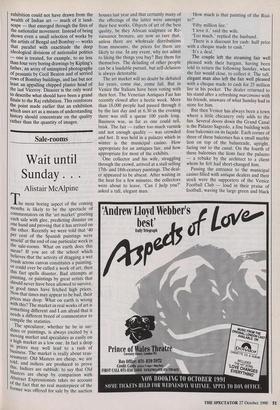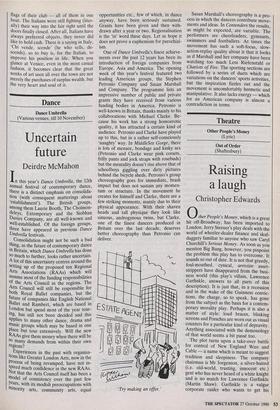Sale-rooms
Wait until Sunday . . .
Alistair McAlpine
The most boring aspect of the coming months is likely to be the spectacleof Commentators on the 'art market' greeting each sale with glee, predicting disaster on one hand and proving that it has arrived on the other. Recently we were told that '40 Per cent of the Spanish paintings were unsold' at the end of one particular week in the sale-rooms. What on earth does this mean? If you are of. the school which believes that the activity of dragging a wet brush across canvas constitutes a painting, or could ever be called a work of art, then this fact spells disaster. Bad attempts at painting, or paintings by great artists that should never have been allowed to survive. In good times have fetched high prices. Now that times may appear to be bad, their prices may drop. What on earth is wrong with this? The market in real works of art is something different and I am afraid that it needs a different breed of commentator to Compile the statistics.
• The speculator, whether he be in sar- dines or paintings, is always excited by a moving market and speculates as easily on a high market as a low one. In fact a drop In prices may well lead to a rush of business. The market is really about reas- sessment: Old Masters are cheap, we are told, and indices are produced to prove this. Indices are rubbish: to say that Old Masters are cheap by comparison with Abstract Expressionists takes no account of the fact that no real masterpiece of the former was offered for sale by the auction houses last year and that certainly many of the offerings of the latter were amongst their best works. Objects of art of the best quality, be they African sculpture or Re- naissance bronzes, are now so rare that, unless there are wholesale distributions from museums, the prices for them are likely to rise. In any event, why not admit to liking the things you buy? Buy them for themselves. The deluding of other people can be a laudable pursuit, but self-delusion is always detestable. The art market will no doubt be debated for years, come rise, come fall. But in Venice the Italians have been voting with their feet. The Venetian Antiques Fair has recently closed after a hectic week. More than 18,000 people had passed through it by the last day and at 6.30 in the evening there was still a queue 100 yards long. Business was, as far as one could tell, brisk. The fair — rather too much varnish and not enough quality — was crowded and hot. It was held in a palazzo which in winter is the municipal casino. How appropriate for an antiques fair, and how appropriate for most of the exhibits. One collector and his wife, struggling through the crowd, arrived at a stall selling 17th- and 18th-century paintings. The deal- er appeared to be absent. After waiting in the heat for a few minutes, the collectors were about to leave. 'Can I help you?' asked a tall, elegant man. `How much is that painting of the Rial- to?'
'Fifty million lire.'
'1 love it,' said the wife.
`Too much,' replied the husband. `There is a discount for cash: half price with a cheque made to cash.'
'It's a deal.'
The couple left the steaming fair well pleased with their bargain, having been told to return the following Sunday, when the fair would close, to collect it. The tall, elegant man also left the fair well pleased with a cheque made to cash for 25 million lire in his pocket. The dealer returned to his stand after a refreshing marzimino with his friends, unaware of what Sunday had in store for him.
But then Venice has always been a town where a little chicanery only adds to the fun. Several doors down the Grand Canal is the Palazzo Sagredo, a fine building with four balconies on its façade. Each corner of three of these balconies has a small marble lion on top of the balustrade, upright, facing out to the canal. On the fourth of these balconies the lions face the palazzo — a rebuke by the architect to a client whom he felt had short-changed him.
Passing the entrance to the municipal casino filled with antique dealers and their stock were the supporters of the Venice Football Club — loud in their praise of football, waving the large green and black flags of their club — all of them in one boat. The Italians were still fighting (liter- ally) their way into the fair right until the doors finally closed. After all, Italians have always preferred objects, they never did like to hold cash. There is a saying in Italy, 'Chi vende, scende' (he who sells, de- scends), so to buy is, for the Italian, to improve his position in life. When you glance at Venice, even in the most casual fashion, it becomes clear that the great works of art seen all over the town are not merely the purchases of surplus wealth, but the very heart and soul of it.



































































 Previous page
Previous page